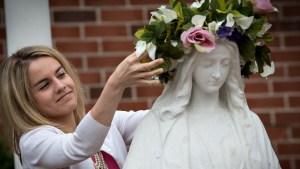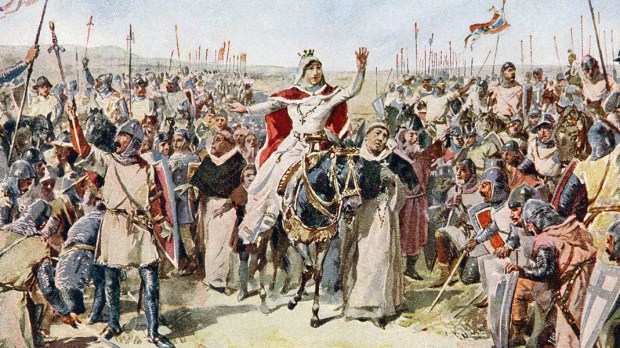Elizabeth was born in 1271 into the royal house of Aragon. St. Elizabeth of Hungary was her great-aunt, and baby Elizabeth was named after her. Her father was King Pedro III of Aragon, and his wife’s name was Constantia.
From an early age, Elizabeth displayed a pronounced devotion to God. Her fasting, regular prayer, and a sense of strong will and determination were evident to all who knew her.
When Elizabeth was 12 years old, her parents betrothed her to King Denis of Portugal. The actual wedding did not take place until King Denis was 26, and Elizabeth was 17. The union would put her faith, tolerance, and humility to the test. She became quickly aware of his infidelity, which was so rampant that it was scandalous in the kingdom. Denis and Elizabeth had two children together but, so reckless was his immorality, that he also fathered seven illegitimate children.
Elizabeth kept leaning on her faith by attending daily Mass, assisting the poor, the sick, and strangers, and simply helping all those who came her way. Her husband demanded that she stop feeding the poor because he felt embarrassed by it. He once caught her carrying bread in her large apron and demanded she show him what was in it. When she opened the apron, dozens of red roses fell to the ground. To this day, Elizabeth of Portugal is still known as “Elizabeth of the miracle of the roses.”

Read more:
7 Queens, princesses and royal women who were saints
Elizabeth persevered despite her philandering husband. She continued praying for his salvation. Her prayers and sacrifice were rewarded when, at last, King Denis gave up his life of sin.
Denis also proved to be a conservationist for his time. He became known as the Farmer King because he planted a vast pine forest near the city of Leiria to prevent the relentless soil erosion that threatened the entire region.
Elizabeth’s commitment to the Gospel was always visible. Not only was she personally devoted to the poor and sick, she asked that the ladies who served her at court care for them as well. The queen was so committed that her bishop testified that Elizabeth had a personal ministry of secretly inviting lepers into her quarters. Once they were inside, she would bathe them and give them fresh clothing — even though the law barred lepers from coming anywhere near the castle.
Elizabeth also took an active part in the politics of the day. In 1297, she became the peacemaker between her husband and Fernando IV of Castile. Her skills at negotiations helped secure the Treaty of Alcatrices, which established fixed borders between the two countries.
Bringing peace between husband and son
She also found herself becoming the intermediary between her husband and her son, Alfonso. Prince Alfonso was one of their two children and had become jealous of the way his father was favoring his illegitimate children over him. The prince gathered an army and was going to go to war against his father. As the two armies gathered together on the field of battle, Elizabeth came riding onto the battlefield, sitting on the back of a donkey. She placed herself between her husband and her son and calmly and logically had them mend their differences. The illegitimate son was sent into exile, and the prince renewed his loyalty to his father, the king. Through the efforts of Elizabeth, peace returned to the land.
When King Denis died in 1325, Elizabeth returned to the monastery she had founded in 1314, inhabited by the Poor Clare Nuns. She joined the Third Order of St. Francis, vowing to devote the rest of her life to the poor and sick. From that point on, that is precisely what she did.
Read more:
How do you know which is the right lay order for you?
In 1336 Queen Elizabeth again had to stop an imminent war. She hurried to the place where the armies were facing off. She was older and worn, but she managed to make peace and arranged a truce. But the journey and efforts had taken their toll. She made it back home but immediately became bedridden. She died on July 4, 1336.
Elizabeth of Portugal earned the title of Peacemaker. Many testified to miracles accomplished through her intercession. She was canonized a saint on May 25, 1625, by Pope Urban VIII.
It is said that King Denis, after repenting of his sins, wrote this poem for his wife:
God made you without peer
In goodness of heart and speech
As your equal does not exist,
My love, my lady, I thus sing:
Had God so wished,
You’d made a great king.

Read more:
We call her Queen because we trust her: Pray to Mary with these comforting words from Benedict XVI

